

| Visitors Now: | |
| Total Visits: | |
| Total Stories: |

| Story Views | |
| Now: | |
| Last Hour: | |
| Last 24 Hours: | |
| Total: | |
Alien Coins Revealed, ET Nickels Worth Hundreds Of Dollars, What Money Will Look Like After ET Overlords Take Over
The hobo nickel is a sculptural art form involving the creative modification of small-denomination coins, essentially resulting in miniature bas reliefs. The nickel, because of its size, thickness, and relative softness, was a favored coin for this purpose. However, the term hobo nickel is generic, as carvings have been made from many different denominations.
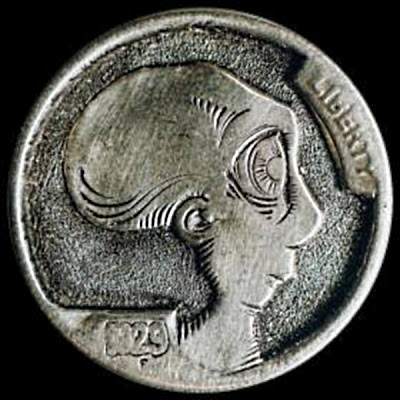
Due to its low cost and portability, this medium was particularly popular among hobos, hence the name.
Here is a brief video explaining the art form and where you might find some new alien coins for other examples of hobo coins as well as how you might make them on your own.
The altering of coins dates to the 18th century or earlier. Beginning in the 1850s, the most common form of coin alteration was the “potty coin”, engraved on United States Seated Liberty coinage(half dime through trade dollar).
This time period was also the heyday of the love token, which was made by machine-smoothing a coin (usually silver) on one or both sides, then engraving it with initials, monograms, names, scenes, etc., often with an ornate border. Hundreds of thousands of coins were altered in this manner. They were often mounted on pins or incorporated into bracelets and necklaces. The love token fad faded out in the early 20th century; love tokens engraved on buffalo nickels are rare.
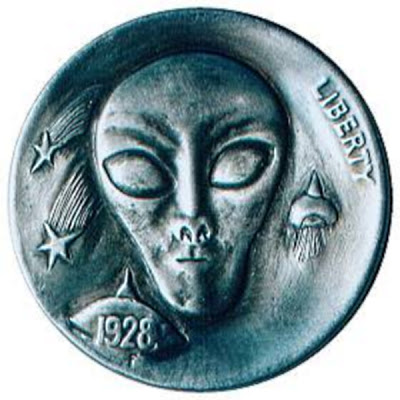
During this time period, hobo-style coin alteration could be found outside the United States, primarily in Britain, France, and South Africa.
The Buffalo nickel
When the Indian Head, or Buffalo nickel, was introduced in 1913, it became popular among coin engravers. The big Indian head was a radical departure from previous designs and would not be seen on any subsequent coins. The large, thick profile gave the artists a larger template to work on and allowed for finer detail.
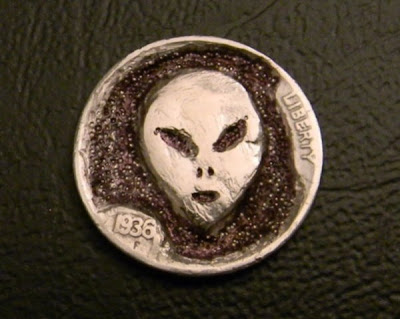
On earlier coins, the head was much smaller in relation to the size of the coin. For example, on a Lincoln cent, the head covers about one-sixth of the area. On the Buffalo nickel, the Indian’s head occupies about five-sixths of the area. Moreover, the nickel is a larger coin. Large heads were sometimes found on earlier coins, such as the Morgan dollar and the Columbian half dollar commemoratives of 1892-93, but these coins were rarely altered because of their high value.
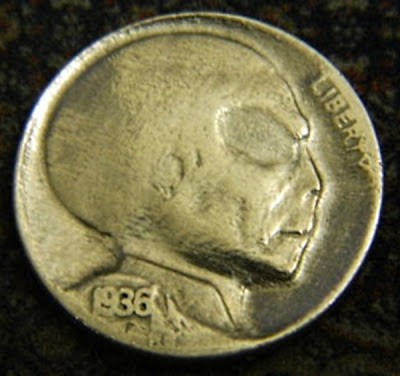
Another factor contributing to the Buffalo nickel’s popularity was the sex of the subject. Nearly all previous coins had depicted women (Liberty head nickels, Indian head cents, Barber and Morgansilver dollars). A male head has larger, coarser features (nose, chin, brow) that can be altered in many ways. Even the buffalo on the reverse could be changed into another animal or a man with a backpack.
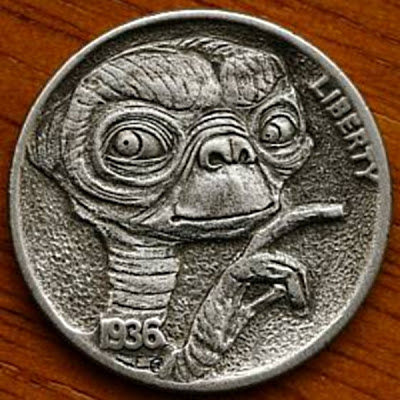
Classic old hobo nickels (1913–1940)
Many talented coin engravers, as well as newcomers, started creating hobo nickels in 1913, when the Buffalo nickel entered circulation. This accounts for the quality and variety of engraving styles found on carved 1913 nickels. More classic old hobo nickels were made from 1913-dated nickels than any other pre-1930s date.
Many artists made hobo nickels in the 1910s and 1920s, with new artists joining in as the years went by. The 1930s saw many talented artists adopting the medium. Bertram Wiegand, known almost exclusively as Bert, began carving nickels in the teens, and his student George Washington Hughes, known as Bo, began carving in the late teens (and up to 1980). During this period, Buffalo nickels were the most common nickels in circulation.
Later old hobo nickels (1940–1980)
The 1940s, 1950s, 1960s, and 1970s were a transitional period for hobo coin engravers, during which the Buffalo nickel was gradually replaced by the Jefferson nickel. Some veteran nickel carvers such as Bo and Bert continued making hobo nickels in the classic old style. Bo, in fact, did his best work in the early 1950s, when he carved many spectacular cameo portrait hobo nickels.
During this 40-year period, many new carvers appeared, and style and subject matter became decidedly modern. Subjects became more ethnically and socially diverse (e.g., a Chinese woman with triangular hat, hippies with long hair and glasses, men wearing floppy hats, etc.). Some of these new artists used new techniques such as power engravers, vibrating tools, and felt marker pens to add color to hair.
By the end of the 1970s, most Buffalo nickels had disappeared from circulation, and the majority of engravings were performed on worn coins. Bo, for example, was forced to obtain Buffalo nickels from coin dealers, some of whom commissioned carvings.
Modern hobo nickels (since 1980)
Many carvers who were active during the 1960s and 1970s continued carving Buffalo nickels into the 1980s. Their coins were altered using punches (dashes, dots, arcs, crescents, stars) and some carving of the profile. The area behind the head is usually rough from dressing with a power tool. They created standard design hobo nickels (derby and beard), as well as many modern subjects, such as occupational busts (fireman, railroad engineer, pizza chef), famous people (Uncle Sam, Einstein), hippies, and others.
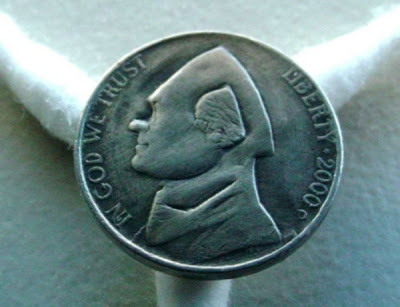
A major event occurred in the early 1980s, demarcating the transition from “old” to “modern” hobo nickels. This was the publication of a series of articles by numismatist Del Romines on the subject of hobo nickels. He soon published the first book on the subject, Hobo Nickels (ASIN B0006R7SFW), in 1982. Both centered on Bo and his carvings.
This resulted in some new artists entering the field, most of whom simply copied Bo’s nickel artwork from the illustrations in Romines’s book. The two major Bo-style copycats were John Dorusa and Frank Brazzell. Together, they produced 20,000 or more modern carved nickels, most of which were copies of Bo’s designs. Dorusa even copied Bo’s “GH” signature (for “George Hughes”) on many of this early creations. Pressure from prominent hobo nickel collectors such as Bill Fivaz convinced Dorusa to stop carving “GH” and put his own initials or name on his works. Dorusa and Brazzell also produced original works, featuring non-traditional subject matter (conquistadors, Dick Tracy, skulls, etc.). The large number of Bo copies led many collectors to label all modern carved nickels as “Neo-Bo’s”, a term no longer in use.
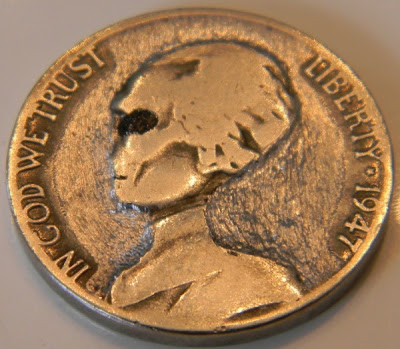
Other carvers also appeared in the 1980s and 1990s, introducing more modern subject matter (cartoon characters, witches, and animals). Most nickel carvers of the 1980s to mid-1990s are regarded by collectors as mediocre at best, but circa 1995, Ron Landis, an engraver in Arkansas, began creating superior quality carvings.
For about four years, Landis was the only nickel carver creating superior carvings, at the rate of only one to two dozen per year (all signed, numbered, and dated). Many other professional engravers have since begun creating hobo nickels.
Some current prolific carvers are converting from quantity to quality, making fewer pieces of high artistic quality (as the market is flooded with lower quality quickly-made carvings). Modern carvings of superior quality sell for about the same prices as classic old original carvings of equal quality by unknown artists.
From the early 1980s to the present, modern lesser-quality carvings could and still can be purchased for as little as $5 to $10 each. Many new collectors found it hard to obtain good-quality old original hobo nickels (as they are so scarce and costly), so they began collecting the readily obtainable and cheap modern works.
About 100,000 (and possibly as many as 200,000) classic hobo nickels were created from 1913 to 1980. Modern artists have created (and continue to create) altered nickels in such large quantities that, within the next few years, the number of modern carvings is expected to surpass that of classic old hobo nickels. Most of the 100,000-plus classic old hobo nickels are not yet in the hands of collectors, whereas almost all modern carvings are. Among numismatists, the modern carvings already greatly outnumber the classic old hobo nickels.
An Indian Head 5-cent piece carved by Bert Weigand sold for $12,500 — or $13,750 with the buyer’s fee last year.
Ornate creations including the work of known modern carvers can range from $200 to $1,000 generally such as the extraterrestrial headed coins.
See more coins at Original Hobo Nickel Society
www.hobonickels.org/
http://hobonickels.org/hobo_files_archive/june_2012.html
More stories:
Meteor Was US Secret Arms Test Says Russian MP
Tour The Universe In Awesome 60 Second Adventures
KURATAS, Own A Giant Battle Robot For $1.3 Million, Videos
Cigar UFO Recorded Near Our Sun By NASA, UFO In NASA Film Of Asteroid, Glowing UFOs Over Fresno
Video: Satellite Sees Russian Meteor Explosion From Space
The Second Coming: Only a Few Years Away; Revelation 17 – Prophecy of the Seven Kings
Are Super-Earths Really Mini-Neptunes?
Eerie Face Of Oldest Known Supernova
NASA: Russian Meteor Not Linked To Asteroid 2012 DA14, The Two Moved In Opposite Directions.
Forget About Leprechauns, Engineers Are Catching Rainbows
Cosmic “Flying V” Formed By Merging Galaxies
New Normal: Superstorms, Wild Weather And Wild Fires
Some Call It The Mark Of The Beast: Stamp Sized Tattoo Monitors Your Health Or Brain Wirelessly
Alien Star Map Engraved In Rock, Similar To Plaque On Pioneer 10
New United States Map, Redrawn With 50 States Equal In Population, Where Will You Be Living?
Mutant Gene Gives Pigeons Fancy Hairdos
Martian Lizard, Strange And Shiny Rocks: NASA Explains
DNA Report Proves Bigfoot Is Real Say 11 Scientists Of 5 Year Study
Ability To Feel Cold Turned Off Selectively
The Hunt For Earth-Like Planets
TV News Video: Many UFOs Seen Entering And Leaving Volcano In Mexico,
Secrets Of The Asteroid Belt Revealed In Computer Simulations Of Solar System Origins
Incredible Wind Power Innovations
Rare Explosion Created Our Galaxy’s Youngest Black Hole
Anonymous Vs. State Of The Union – Battle Royale For The Future Of The Internet
Middle East Running Out Of Water Faster And Faster
KAIST Develops Wireless Power Transfer Technology For High Capacity Transit
Dorner Cabin Fire Set Deliberately Say Scanner Monitors, Scanner Traffic Silenced Say Listeners
New Story Of The Death Of Osama Bin Laden
Coral Reef-cam: Study Shows Which Fish Clean Up Reefs
Drone Spotted Over Oakland Sparks Outrage and Protests
Video: Finger Of God Strikes Vatican?
Dorner Declared A “Domestic Terrorist”
“Grave Violation” “Highly Provocative” Nuclear Test In North Korea Concerns World
Ancient Magical Illusion Even More Effective Than Magicians May Realize
Russia Emerges As World’s Top Gold Buyer, Adding 570 Metric Tons In Last Decade
Commando Who Shot Bin Laden Abandoned By U.S. Military, Left In Poverty
Tree Die-Off Triggered By Hotter Temperatures
Deciphering The ‘Language Of Sugars’ To Benefit Health And Industry
2012 U.S. Shark Attacks Highest Since 2000
Giant Red Flashing UFO Caught On ISS Live Cam; UFO Hot Spot In Texas
The Devil’s Bible: Codex Gigas
Private Death Star Project On Kickstarter, Raises $400,000 Of Needed $850 Quadrillion
Curiosity Rover Collects First Martian Bedrock Sample
Never Get Dirty Or Wet With Ultra Ever Dry Coating
Proof Of Aliens On Earth And Mars, Videos And Photos
Superfast Materials: ‘Organic Topological Insulators’ For Quantum Computing



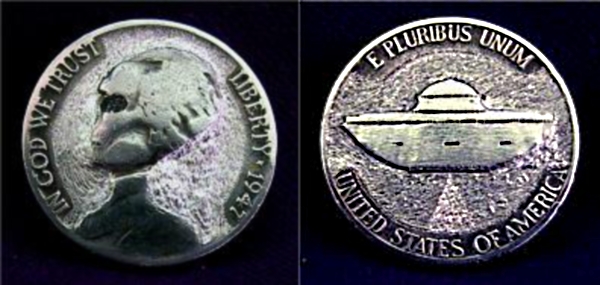
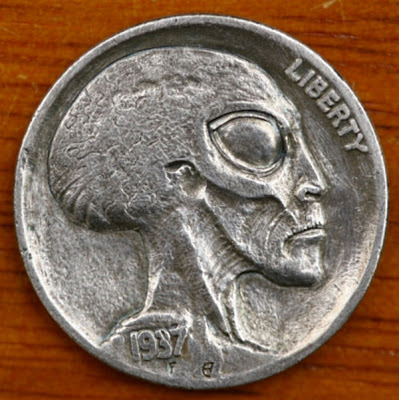
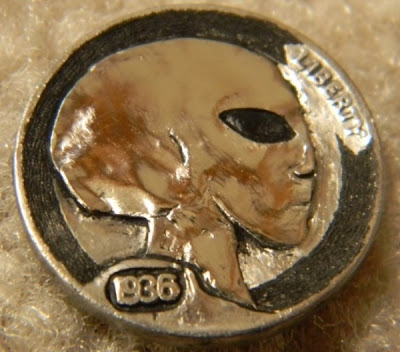
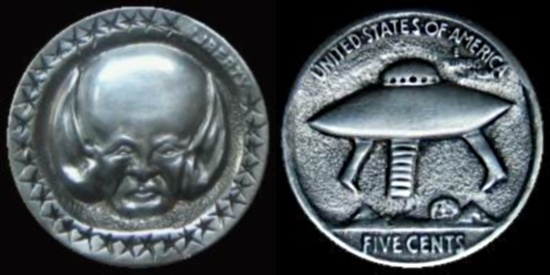
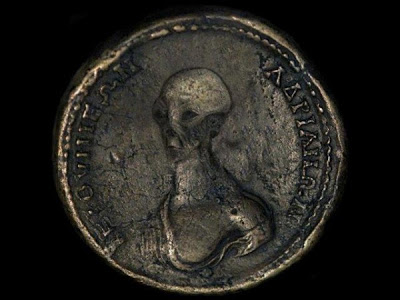
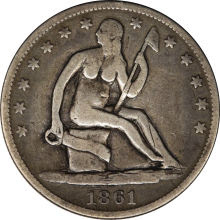
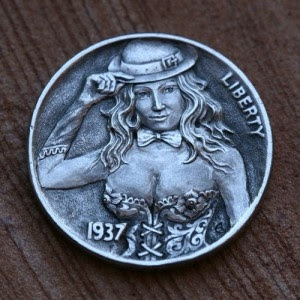
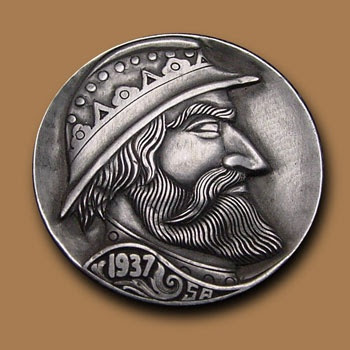
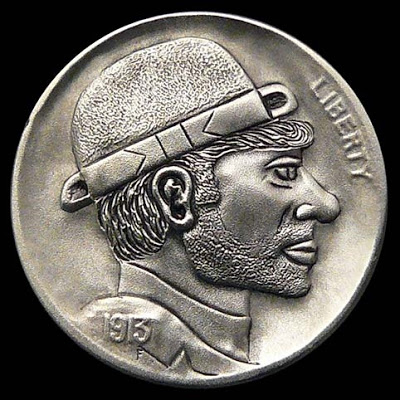
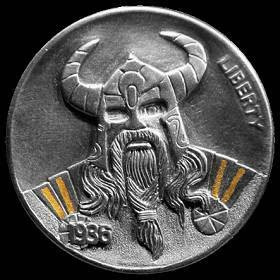
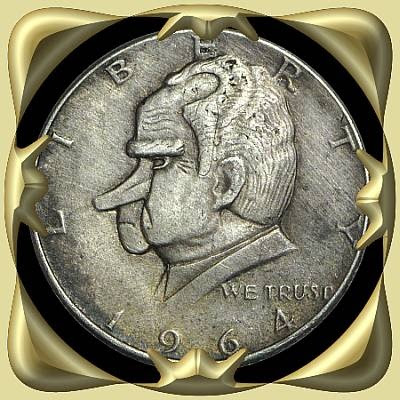
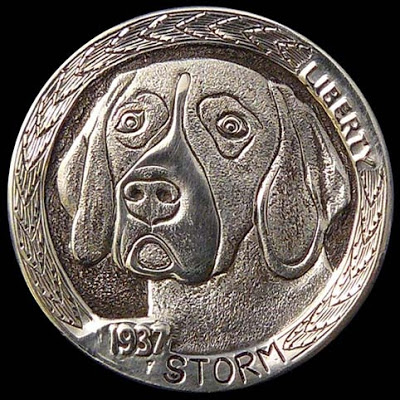
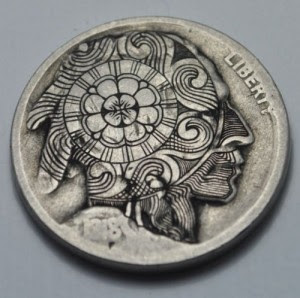
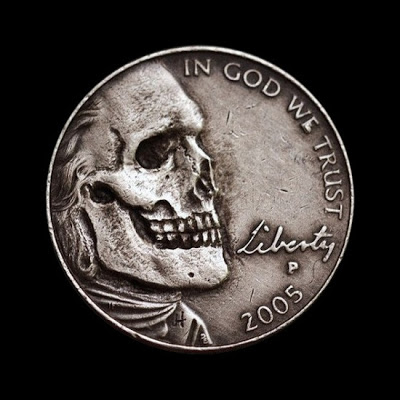
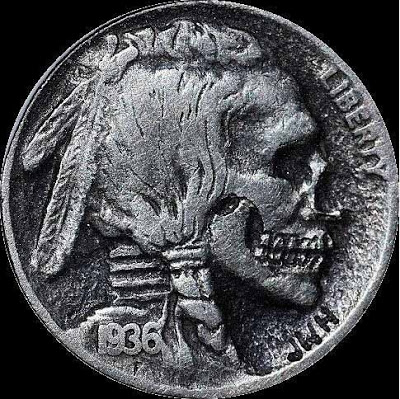
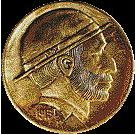

If these coins are any indication of the technology possessed by our Alien Overlords, how in the Universe did the have the technology to get here? Our pitiful human coins have far greater precision and detail than these extraterrestrial coins. So, at least we have the E.T.’s beat on certain technologies.
Very cool and fun info, I collected coins when I was a kid and never saw any this cool!
These are pretty cool, but isn’t there something in the law that prevents defacing the currency?
Still, they are cool.
Not in the U.S.A. I have a one Dollar Bill with Adolf on one side apparently still legal tender,
bought it 20 years ago for 10 dollars
For five cents!!!
Good article with great pictures! With the metal content of the US nickle at 7% over face value (February 15, 2013) it’s likely they will stop minting them soon.
Amazing, I remember when I found a coin marked 50,000 BC, I wish I had kept it I’m sure it would be worth a fortune.
Lol pathetic.
you’re kidding right?